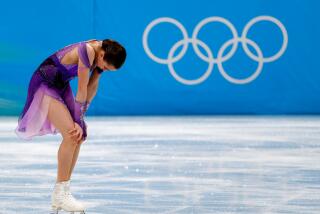Sydney Games to Test for EPO
- Share via
The International Olympic Committee, intending to blunt use of the “in” drug in many sports, announced Monday it has approved testing at next month’s Sydney Summer Games for EPO, a banned performance-enhancing substance.
The IOC’s ruling Executive Board announced that at least 300--and perhaps as many as 700--combined blood and urine tests will be performed in Sydney for EPO, or erythropoietin, which helps athletes train longer and harder.
The action means the IOC will be the first major sports enterprise to test on a wide scale for EPO. It has been the cheaters’ drug of choice for several years--particularly in endurance events--because it had been undetectable.
IOC officials hailed the testing as a major step forward in their long-running campaign to stop doping, even though critics and experts said Monday it appears to be easily beatable and the IOC could do even more to stop cheaters.
“It preserves what I believe is our momentum at the head of the fight against doping in sports. And if it strikes a little terror into the heart of cheaters . . . that’d be terrific,” said Dick Pound, a Canadian IOC vice president who is also chairman of the newly established World Anti-Doping Agency.
In other action Monday, the Executive Board whittled the list of cities bidding for the 2008 Summer Games from 10 to five: Beijing; Istanbul, Turkey; Osaka, Japan; Paris; and Toronto.
Eliminated were Bangkok; Cairo; Havana; Kuala Lumpur, Malaysia; and Seville, Spain.
The 2008 Games will be awarded next July and insiders say Beijing is the leading candidate. Seven years ago, it lost the 2000 Games to Sydney by two votes. The night before that vote, a senior Australian official later disclosed, he offered $35,000 apiece to the national Olympic committees of Kenya and Uganda--to help finance sports in those countries, he said.
As for EPO, abuse has gone virtually unchecked since it was developed in the late 1980s to help people with blood disorders.
Modeled after a natural hormone, synthetic EPO stimulates the creation of red blood cells. More red blood cells mean more oxygen-carrying capacity. Researchers say EPO can improve performance by as much as 15%.
Officials can only guess at how many athletes use EPO and other performance-enhancing substances--among them human growth hormone (hGH) and insulin-like growth factor (IGF-1). Estimates range from 10% to 99%.
Used improperly, researchers say, EPO can turn the blood into the consistency of molasses.
From 1987 to 1991, the drug was circumstantially linked to the deaths of 18 European cyclists.
EPO was the drug at the heart of the scandal during the Tour de France two years ago, when several cycling teams were ousted or withdrew abruptly.
On Monday, the International Cycling Union announced that Thomas Frischknecht of Switzerland would be awarded the 1996 mountain bike world championship. French rider Jerome Chiotti, the original winner, confessed in April to a French magazine that he had used EPO.
The Sydney Games begin Sept. 15. On Aug. 1, the IOC’s medical commission recommended a combined urine and blood test for use at the Games.
The first, developed by French researchers, seeks to differentiate between natural and artificial EPO in urine. The second, from Australian scientists, looks for changes in blood composition. The IOC helped fund both research projects.
Both the urine and blood tests must be positive for an athlete to be considered guilty of EPO use in Sydney.
On Sunday, IOC legal experts gave the combined test the go-ahead, and the full Executive Board gave its assent Monday.
The longtime head of the IOC’s medical commission, Prince Alexandre de Merode of Belgium, told reporters Monday that no sport will be singled out and athletes will be chosen at random. Tests will begin Sept. 2, he said.
During the Games, the IOC will oversee thousands more tests, most of them urine tests for steroids and other substances.
Meantime, the new World Anti-Doping Agency is coordinating the random, unannounced, out-of-competition testing of half the 10,500 athletes headed for Sydney.
Critics remain unimpressed.
Even if the IOC manages to test 700 athletes for EPO in Sydney, more than 90% of all competitors will go untested, observed Charles Yesalis, a professor at Penn State University and an expert on IOC anti-doping efforts.
Moreover, he said, the odds of getting caught for using EPO are slim, since both the blood and urine tests must turn up positive.
The blood test can detect EPO weeks after use but the urine test goes back only three days. Theoretically, a cheater could have used EPO four days before the test and not get punished.
“It will have no effect on how level the playing field is,” Yesalis said of the combined test. “People will circumvent it. I’m not trying to be a wise guy. It’s PR fluff, the whole damn thing.”
Frank Shorter, the 1972 marathon champion who now is chairman of the new United States Anti-Doping Agency, urged IOC officials to take another step--to freeze all blood samples taken at Sydney.
When better tests become available for such substances as human growth hormone, the samples will still be available and that, Shorter said, would be a real deterrent.
He added: “I would hate to have Sydney go down as the last Olympics in history in which the clean athletes are ignored.”
More to Read
Go beyond the scoreboard
Get the latest on L.A.'s teams in the daily Sports Report newsletter.
You may occasionally receive promotional content from the Los Angeles Times.






